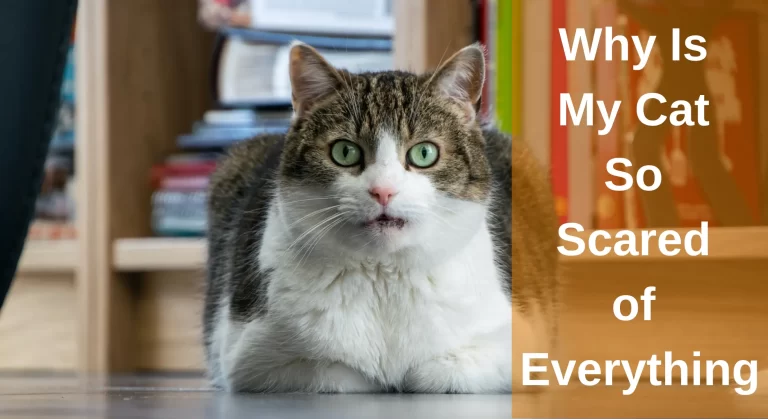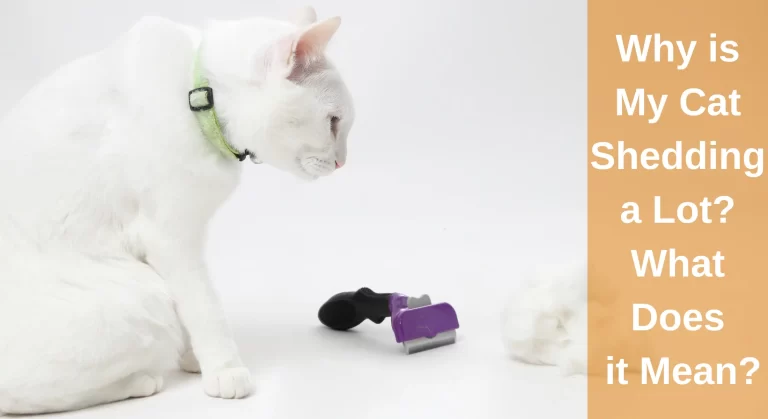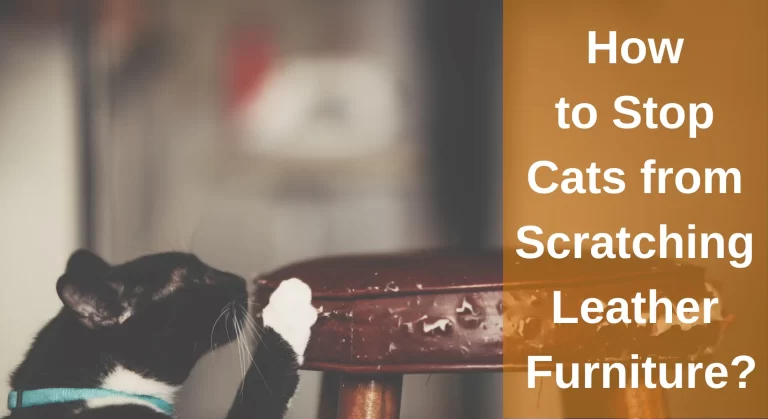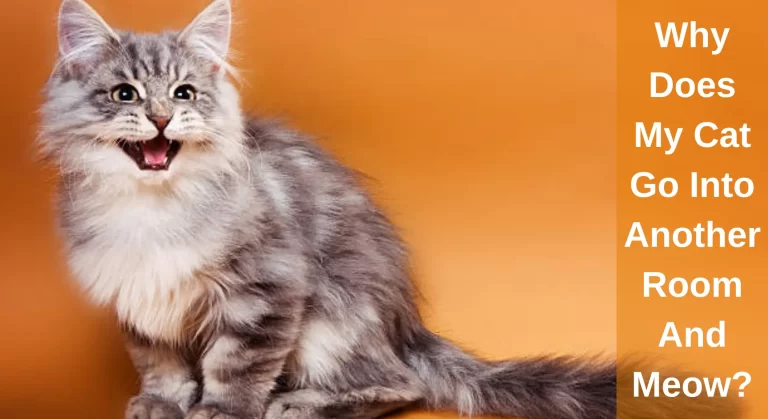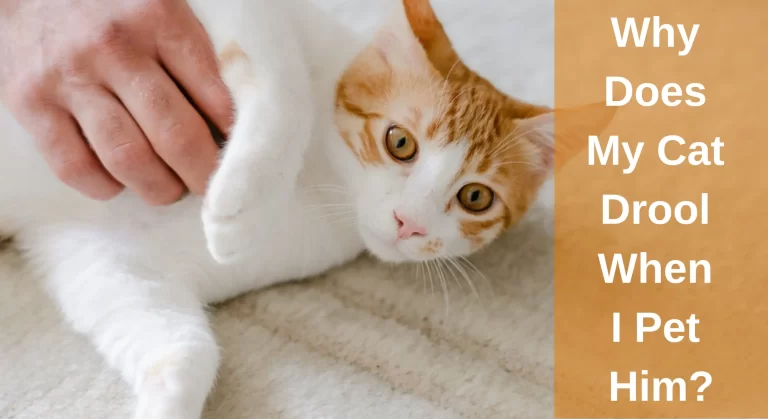Why Does My Cat Sleep On Me? The Purr-fect Bond: Unraveling the Mystery
As cat owners, we often find ourselves wondering about the peculiar behaviors exhibited by our feline friends. One common behavior that many cat owners experience is their cat choosing to sleep on top of them. Do you ever wonder why your cat insists on curling up and sleeping on you? Whether it’s a subtle kneading of your lap or a full-on sprawl across your chest, your feline companion seems to have a special affinity for snoozing on top of you. While it may seem baffling at first, there are several reasons why cats prefer this cozy arrangement.
Cats may sleep on their owners as a sign of trust, affection, and a desire for warmth and comfort. Your presence provides them with a sense of security and companionship, making your lap or body an appealing place to rest. Additionally, the rhythmic movements and sounds of your breathing may have a soothing effect on your cat, contributing to their desire to sleep on you.
In this article, we’ll explore the intriguing reasons behind this behavior and shed light on the fascinating bond between cats and their human counterparts.
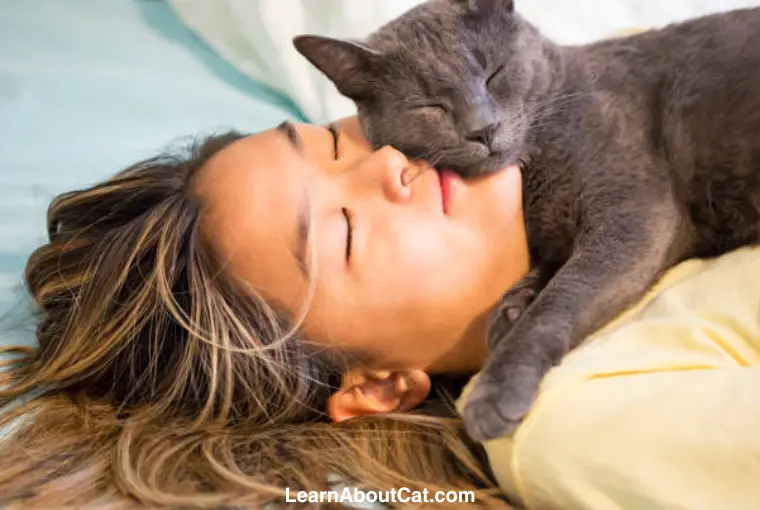
Reasons Why Does My Cat Sleep On Me
To comprehend why cats sleep on their human counterparts, it’s essential to understand their natural behavior. Cats are known for their independent nature, but they also have social tendencies. Despite their solitary instincts, cats establish close bonds with their owners and seek companionship.
The Comfort Factor: Cats Seek Warmth and Security
Cats Are Natural Heat Seekers
One of the primary reasons why cats choose to sleep on their owners is the quest for warmth and security. Cats are naturally attracted to warmth, and the body heat radiating from their human provides them with a cozy and comforting environment. Curling up on their owner’s lap or snuggling against their chest helps cats feel safe and protected, reminiscent of their early days with their mother.
Establishing Bonds, Trust, and Warmth
Cats are pretty social creatures, and snoozing beside their owners is a purr-fect way to build a strong connection and show some love. When your feline friend decides to snuggle up on you, they’re not just looking for a cozy spot—they’re creating a special closeness and a warm sense of togetherness. It’s their way of saying, “Hey, let’s get even closer, human!”
This adorable behavior is all about trust and affection. By curling up with you, they’re entrusting you with their sleepy time sanctuary, making it clear that you’re their trusted companion.
It’s no surprise that cats who share a deep bond with their owners tend to engage in this behavior more often. They crave that closeness and connection, even when they’re catching some z’s.
Comfortable Sleeping Surface
While cats have their own designated sleeping areas, they may prefer the comfort of your body as a sleeping surface. The contours and warmth of your body offer a cozy and supportive space for them to rest. Your presence also adds a sense of companionship and reassurance, making it an irresistible choice for them to curl up and enjoy a peaceful slumber.
Check Out: Why Does My Cat Follow Me Everywhere And Sleeps With Me?
The Practical Reasons: Cats’ Instinctual Behaviors
Safety and Security
Cats are instinctually wired to seek out safe and secure sleeping spots. In the wild, cats are vulnerable while they sleep. By choosing to sleep on their owners, cats feel safer and more protected against potential threats. This instinctual behavior stems from their natural survival instincts, where they seek out elevated and secure sleeping spots to avoid predators. Sleeping on their human provides them with a sense of security, knowing that their trusted companion will keep watch over them.
Keeping Watch and Staying Alert
Another intriguing reason why cats sleep on their owners is their innate instinct to stay vigilant. Cats are naturally alert creatures, and by positioning themselves on top of you, they can maintain a watchful eye on their surroundings. It’s an evolutionary behavior that stems from their need to be aware of any potential threats or changes in their environment.
Interesting Reading: Why My Cat Suddenly Wakes Up Scared?
The Scent Connection: Marking Territory and Claiming Ownership
Marking Terrority: Cats Are Highly Scent-Oriented Animals
Cats possess an extraordinary sense of smell, and scents hold immense importance in their lives. Fascinatingly, cats have scent glands distributed throughout their bodies, including their paws and face.
When your feline friend cozies up and snoozes on you, it’s actually their way of leaving their distinctive scent behind, effectively staking their claim on you as a part of their territory. This behavior signifies a profound sense of trust and ownership, as they establish you as an integral part of their domain.
Creating a Harmonious Blend of Scents: A Comforting Bond
But there’s more to this scent-based ritual than meets the eye. As your cat transfers their aroma onto you, it intertwines with your own scent, creating a delightful symphony of smells. This unique blend fosters a comforting and familiar environment, offering a tranquil haven for both you and your furry companion. Moreover, your scent acts as a soothing reminder for your cat, invoking a sense of familiarity and security in their surroundings.
The Comforting Aura of Your Scent
Cats possess a remarkable olfactory ability, and they derive immense solace from the familiar scent of their cherished owners. Your distinct aroma becomes synonymous with safety and contentment, transforming you into an inviting and calming sleeping companion for your feline companion. The scent emanating from your clothes or bedding has a profound effect, inducing a state of relaxation and facilitating a better night’s sleep for both you and your beloved cat.
By intertwining scents and creating a unique olfactory harmony, cats strengthen their connection with you, fostering an even deeper bond. This intricate mingling of aromas reinforces their sense of belonging and familiarity, solidifying the profound connection between you and your treasured feline friend.
The Social Connection: Cats as Social Creatures
Cats Crave Social Interaction
Contrary to popular belief, cats are social animals who thrive on companionship. While their expression of it may differ from our canine pals (dogs), cats still yearn for social interaction and closeness in their own unique way.
Cats are highly intelligent creatures that thrive on mental stimulation and social interaction. Even during their restful moments, snuggling up and sleeping on their owners allows them to remain close to the action. They relish being in the company of their humans and find solace in the gentle rhythm of their breathing or the comforting beat of their heart. By opting to sleep on you, they forge a connection that enhances their overall well-being and happiness.
Attention, Stimulation, and Companionship
For some cats, choosing to sleep on their owners is a clever way of seeking attention and stimulation. They understand that by resting on you, they have your undivided focus, creating an opportunity for gentle strokes and petting. This delightful interaction provides both mental and physical stimulation, satisfying their need for affection and play, even during their tranquil slumber.
When your cat chooses to sleep on you, it’s a clear indication that they value your company and affection. By being close to you during their resting time, they can experience a sense of security and contentment. It’s their own way of saying, “You’re an important part of my life, and I enjoy being near you.”
Also Read: Why Does My Cat Make Biscuits On Me? Why Do Cats Knead?
Other Reasons Why Do Cats Sleep on Their Owners
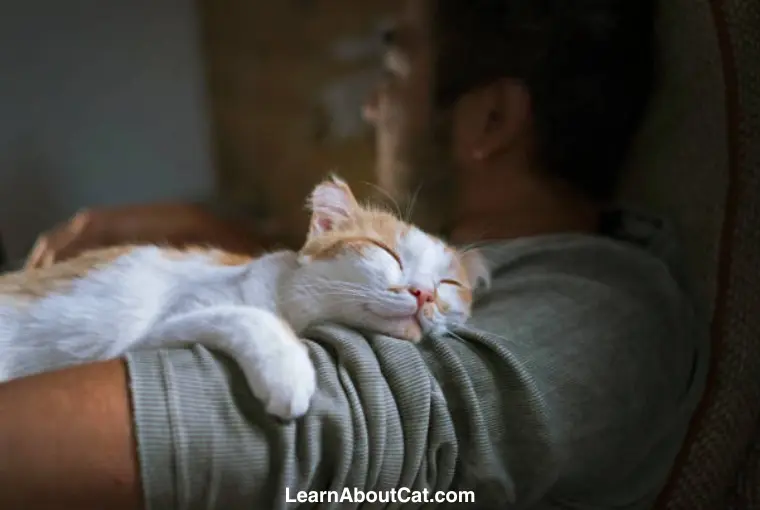
Just Out of Habit: A Routine of Comfort
Sometimes, a cat sleeping on you may simply be a matter of habit. If you have allowed your cat to sleep on you in the past, they may have grown accustomed to the routine and find it comforting. Cats are creatures of habit and thrive on familiar routines. If your cat has developed a habit of sleeping on you, breaking that pattern may require some gentle redirection and providing alternative cozy sleeping spots.
The Hormone Factor: Influences of Nature
Hormonal factors can also come into play when a cat decides to curl up on their owner. Female cats, in particular, may exhibit this behavior during specific stages of their reproductive cycle. The shifts in hormones can influence their behavior, making them more affectionate and inclined to seek close contact. So, if your female cat tends to choose you as their sleeping spot during certain periods, it could very well be driven by her hormonal changes.
Health Benefits
Sleeping with cats has been found to offer certain health benefits for their owners. The rhythmic sound of a cat’s purring has a soothing effect that can help reduce stress and promote relaxation. The presence of a cat during sleep has also been linked to improved sleep quality and reduced feelings of loneliness.
However, it’s important to ensure that your sleeping arrangements are safe and comfortable for both you and your cat.
Why Do Cats Sleep on Certain Parts of Your Body
Have you ever wondered why your cat chooses specific body parts to snuggle up and snooze on? Well, let’s uncover the mysteries of your cat’s sleeping preferences, one body part at a time!

Why Does My Cat Lay on My Chest?
The chest—your cat’s favorite spot to rest their furry little head. When your cat lays on your chest, it’s a sign of ultimate trust and affection. They feel the rhythm of your heartbeat and find comfort in the rise and fall of your chest as you breathe. It’s like having their very own human-powered lullaby, soothing them into a deep slumber.
Why Does My Cat Sleep on My Legs?
You may have noticed your cat taking a catnap right on top of your legs. Well, it turns out your legs are like a warm and cozy cat bed! Your cat is drawn to the comforting heat emanating from your lower extremities. Plus, your legs provide a stable and secure surface for them to sprawl out and enjoy their beauty sleep.
Why Does My Cat Sleep on My Head?
The curious case of the head-sleeping feline! If your cat enjoys perching on top of your head, it’s likely a combination of seeking warmth, claiming dominance, and curiosity. Your head is a cozy spot, radiating heat and offering a prime view of the surroundings. Plus, your cat loves to show off their superior status by conquering the highest point in the room—your head!
Why Does My Cat Sleep on My Pillow?
Have you ever woken up to find your cat snuggled up on your pillow, taking up precious space? Well, your cat sees your pillow as the comfiest spot in the house—just like you do! They love the softness and familiarity of your pillow, which carries your scent and provides a sense of security. Plus, being close to you even while you sleep brings them comfort and reassurance.
Why Does My Cat Prefer to Sleep on My Lap?
The lap of luxury! If your cat has a penchant for curling up in your lap for their beauty sleep, consider yourself honored. Your lap is the ultimate cozy haven for your feline friend. It’s a warm and comforting spot where they can feel safe, loved, and oh-so-adorable. So, enjoy the purrs and the precious moments together as your cat takes a catnap right in your lap.
Also, Check Out: Do Cats Get Clingy When You Are Pregnant?
Should I Let My Cat Sleep With Me? Pros and Cons
Allowing your cat to sleep with you is a decision that many cat owners face. While it can be a delightful experience to have your feline friend snuggle up with you during the night, there are both pros and cons to consider. Let’s explore the advantages and disadvantages of letting your cat sleep in your bed.
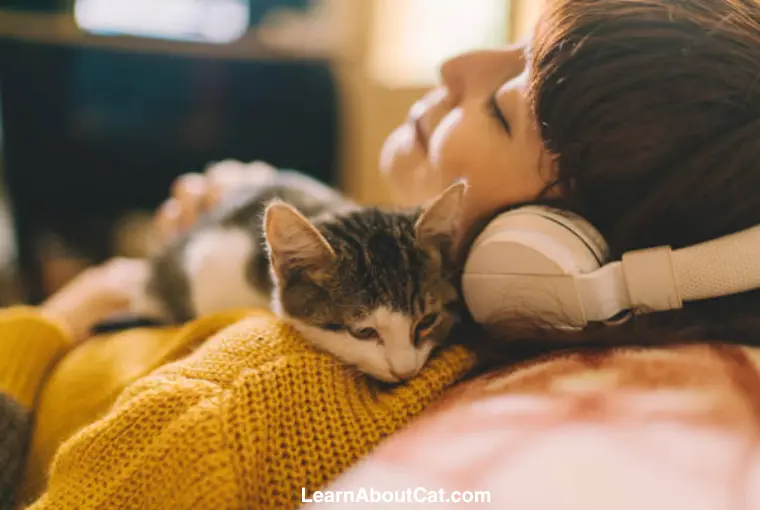
Pros
1. Bonding and Companionship: Sleeping with your cat can strengthen the bond between you. It creates a sense of closeness and provides an opportunity for quality time together. Sharing a sleeping space can enhance companionship and deepen the emotional connection between you and your cat.
2. Warmth and Comfort: Cats are naturally drawn to warmth, and sleeping with you provides them with a cozy and comfortable spot. Your body heat offers them a warm and soothing environment, which can promote relaxation and better sleep for both of you.
3. Stress Relief: Cats are known for their calming presence, and having them sleep beside you can help reduce stress and anxiety. Their rhythmic purring and gentle presence can have a soothing effect, helping you unwind and promoting a sense of tranquility.
4. Security and Protection: Your presence during sleep can provide a sense of security for your cat. They may feel safer knowing that their human companion is nearby, which can help alleviate any potential fears or anxieties they may have.
Cons
1. Allergies and Asthma: If you have allergies or asthma, sleeping with your cat may exacerbate your symptoms. Cats can carry allergens in their fur, which can trigger allergic reactions or respiratory issues in sensitive individuals. It’s important to consider your health and consult with a healthcare professional if you have any concerns.
2. Sleep Disturbance: Cats are nocturnal animals by nature, and they may exhibit active behavior during the night. This can include meowing, scratching, or pouncing, which may disrupt your sleep. If your cat’s nighttime activity significantly affects your sleep quality, it may be better to provide them with a separate sleeping area.
3. Hygiene and Cleanliness: Cats groom themselves regularly, but they can still carry dirt, bacteria, or parasites in their fur. Allowing them to sleep in your bed can potentially transfer these contaminants onto your sheets and bedding. Regular cleaning and grooming routines for your cat, as well as keeping your sleeping area clean, can help mitigate this concern.
4. Personal Space and Boundaries: Some individuals may prefer to have their personal space during sleep and may find it difficult to relax with a cat in close proximity. If you value having your own sleeping area free from pet hair or movement, it may be better to establish boundaries and provide your cat with its own comfortable sleeping space.
What to Do If Your Cat Is Ruining Your Own Sleep?
Oh, the irony! You love your feline friend to bits, but their nocturnal shenanigans are wreaking havoc on your precious sleep. Fear not, weary cat parent, for there are ways to regain your sleep and restore harmony in your bedroom. Here’s what you can do:

- Playtime Before Bed: Cats are natural hunters, and a good play session before bedtime can help tire them out. Engage your cat in interactive play with toys that mimic prey, allowing them to indulge their hunting instincts. A tired cat is more likely to settle down for a snooze, giving you a better chance at a good night’s sleep.
- Establish a Bedtime Routine: Cats, like humans, thrive on routine. Establish a consistent bedtime routine that includes activities like feeding, grooming, and interactive play. By following a predictable routine, you can signal to your cat that it’s time to wind down and prepare for sleep.
- Create a Cozy Cat Haven: Cats love having their own cozy space to retreat to. Provide your feline friend with a comfortable and inviting sleeping area, such as a soft cat bed or a designated blanket. Make this spot enticing by placing it in a quiet corner away from distractions and ensuring it’s warm and inviting.
- Set Up Cat Entertainment: Sometimes, cats just need a little extra stimulation to keep them occupied during the night. Consider providing them with interactive toys, puzzle feeders, or a window perch that allows them to observe the outside world. This can help keep them engaged and entertained while you catch some much-needed shut-eye.
- Close the Bedroom Door: If all else fails and your cat’s nighttime antics persist, it might be time to establish a “no entry” policy in your bedroom. Close the bedroom door or use a baby gate to create a physical barrier. This ensures that you have a cat-free zone where you can sleep undisturbed.
Remember, it’s important to be patient and consistent when implementing any changes. Cats are creatures of habit, and it may take some time for them to adjust to new routines or boundaries. If you’re concerned about your cat’s behavior or suspect underlying health issues, consult with your veterinarian for further guidance.
Restful nights are within reach, even with a mischievous cat in tow. With a bit of effort and understanding, you can create an environment that promotes both your sleep and your cat’s well-being.
Frequently Asked Questions
Why Do Cats Sleep with Their Backs Toward Us?
Ever noticed your cat turning their back on you while they sleep? Don’t worry—it’s not a sign of kitty rudeness. Cats are naturally independent creatures, and sleeping with their backs toward us is their way of staying alert to their surroundings. By facing away, they can keep an eye on any potential threats or sneaky prey. It’s just their feline instincts at work, making sure they’re always ready for action.
Why Does My Cat Twitch in Their Sleep?
If you’ve ever observed your cat twitching or making slight movements while asleep, rest assured that it’s perfectly normal. Cats, like humans, experience different sleep stages, including REM (Rapid Eye Movement) sleep. During REM sleep, cats may exhibit muscle twitches, tail flicks, or paw movements. It’s believed that these movements are a reflection of their dreams or the physiological processes occurring during that sleep stage. In most cases, these twitches are harmless and should not cause concern.
Is it normal for my cat to sleep on me every night?
Yes, it is normal for cats to choose to sleep on their owners consistently. Cats often seek comfort, warmth, and security by sleeping on their human companions.
Is it normal for cats to change their sleeping preferences over time?
Yes, cats’ preferences and behaviors can change as they age or due to various environmental factors. It’s important to observe and adapt to their evolving needs, providing them with appropriate sleeping options.
Should I allow my cat to sleep with me if I have allergies?
If you have allergies, it is generally recommended to keep your cat out of the bedroom or designate a specific sleeping area for your cat to minimize exposure to allergens during sleep.
What if my cat doesn’t sleep on me at all?
Not all cats have the same sleeping habits, and some may choose to sleep in their own designated areas or cozy spots around the house. It’s essential to respect their preferences and provide them with comfortable alternatives.
Should I be concerned if my cat doesn’t sleep on me?
No, you should not be concerned if your cat doesn’t sleep on you. As long as your cat is happy, healthy, and showing affection in other ways, there is no cause for concern.
Why does my cat sleep on me and not my partner?
Cats choose their preferred sleeping spots based on personal preferences and individual relationships. Your cat may have formed a stronger bond with you or finds your body heat more comforting. It’s important to respect your cat’s choices and not take it personally.
Can cats suffocate when they sleep on top of humans?
Cats generally have a keen sense of self-preservation and will adjust their position to ensure their own comfort and safety. However, it’s always essential to practice caution and be mindful of your cat’s movements while sleeping together. If you have concerns, consult with your veterinarian for guidance.
Conclusion
Cats have their own individual preferences when it comes to sleeping on certain parts of your body. Whether it’s your chest, legs, head, or pillow, each spot holds a specific appeal for them. It’s a sign of trust, affection, and a desire for warmth and security. Understanding and embracing these sleeping habits can deepen the bond between you and your cat.
Remember to provide alternative cozy spots for them if needed and cherish the moments of closeness and love shared during these sleepy snuggles. So, enjoy the warmth and joy of being your cat’s chosen sleeping companion, and treasure the unique connection you have with your feline friend.
Who is Isabella?
My name is Isabella, and I am a dedicated and knowledgeable cat enthusiast. With years of experience caring for cats and a deep love for felines, I made a mission to help other cat lovers navigate the challenges of cat ownership.

